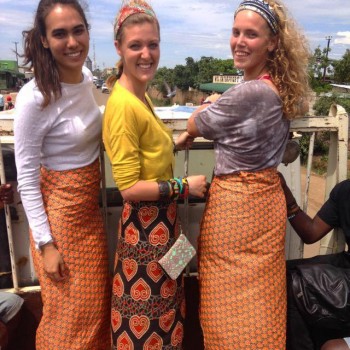By Marisa Kallenberger
The power went out. Music started blasting from a nearby yard. A moonlit dance party erupted in the neighborhood of Kamwala. Everyone, from two year olds, to their grandmothers, to the university students from America (although one was clearly inferior in the dancing department), joined in. This was my first night in Lusaka, Zambia.
Zambia is a land-locked country in the southern region of Africa, not often seen in international news. Unlike some of its neighboring countries, Zambia does not experience civil unrest, and remains a relatively peaceful nation. Similar to its bordering countries, Zambia is unfortunately wrought with high HIV rates, malaria, and the effects of cyclical poverty. 75% of Zambians live on less than $1.25 a day, almost 50% of the entire nation’s population is under the age of 14, 40% don’t have access to clean drinking water, and just 7% graduate from Grade 12.
Modzi, founded by a Northeastern alumna, mentors vulnerable youth in Zambia and facilitates their access to quality education. Modzi seeks to increase the staggering 7%. The organization informally started three years ago and recently earned its 501(c)(3) status in 2015. I was specifically attracted to this co-op opportunity at a small start-up nonprofit because I felt that my work in a short period of time could make a great impact.
But I didn’t find this opportunity, this opportunity found me.
The idea to co-op with Modzi first arose when a professor mentioned the opportunity and said I’d be a great fit for the job. Flattered as I was, I was still determined to sit at a desk in Boston during the most frigid months of the year, and pursue an opportunity that could potentially lead to a prospective job. I thought that after the past year and a half of moving around at different chances that led me to South Africa, Texas, and Western Europe, it was finally time to stay in one place and get serious (whatever that meant). I was picturing my next co-op to be a corporate one, with the word “business” somewhere in the dress code.
A few days later, I sat across from another student in Northeastern’s Curry Student Center who had a Modzi sticker on her laptop. Intrigued by the freakish coincidence, I started a conversation and learned that she had been with on a summer Dialogue in Zambia and was returning to co-op with Modzi in the spring. I was impressed that someone who had spent just weeks working in a place was so impacted that she wanted to go back.
I admired the motivation behind the establishment of Modzi and the local partnerships that continue to connect the organization to the communities. I respected the well-planned principle that Modzi raises funds for a child’s entire schooling before joining their scholarship program. I had always wanted to challenge myself with international fieldwork, and the added bonus of a warm climate during the wintertime and a culture I knew nothing about selfishly excited me.
As I’ve been told countless times by the same friends, family, professors, and advisors that were encouraging me to take the role, “You make plans for yourself…and then life laughs at them.”
I, a rising senior in the D’Amore-McKim School of Business, concentrating in Supply Chain Management and minoring in Human Services and Global Social Entrepreneurship, found myself in Zambia. Through my co-op, I’ve been able to apply material learned in the classroom to a very real-world experience. The once hypothetical exercises in my Supply Chain Management classes of getting goods to a land-locked country without proper infrastructure and transportation, have come to life. I’ve unfortunately witnessed aspects of the same corruption that I’ve studied in International Business. I’ve seen Zambia’s economy decline due to its over-reliance of copper, its principle export, and China, its main investor. I buy goods from the survival entrepreneurs I’ve learned about in Social Entrepreneurship, and have admired officers of partner organizations for using the counseling techniques I’ve practiced in Human Services classes.
This co-op has also materialized experiences that would have been impossible to prepare for from behind a desk. Here, there are so many intricacies within failing systems and complexities within each individual’s circumstance that can only be understood on the ground.
I’ve seen students out of school for terms at a time, for being just $5 USD short of uniform fees, boys unable to afford a haircut, turned away from school because of the length of their hair, and students’ educations interrupted when teacher absences and electricity outages prevent the overcrowded classrooms from learning. I’ve conversed with dozens of young boys and pregnant girls who slip through the cracks of child protection, and live on the streets struggling with substance abuse, not currently enrolled in school. I’ve met with drunken, impoverished parents of the same students modzi sends to school. I’ve observed authoritative figures abuse their power to put personal gain before others’ basic needs, and held back tears listening to kids tell their personal stories, having escaped their own war-torn nations to come to Lusaka.
It’s been eye-opening to learn about the different barriers the students face, while crucial in order to fully understand how best to find a solution. In addition to witnessing hardships and systemic challenges, I’ve also seen these students succeed despite them.
Modzi students that previously lived on the streets are now earning high marks on the nationally administered exams, play lead roles in theatrical performances, and are elected by peers as class representatives. These positive outcomes make all the difficult work worthwhile. While the path to success can prove to be drastically different than anticipated, taking risks can lead to unforeseeable learning opportunities and rewarding experiences.



